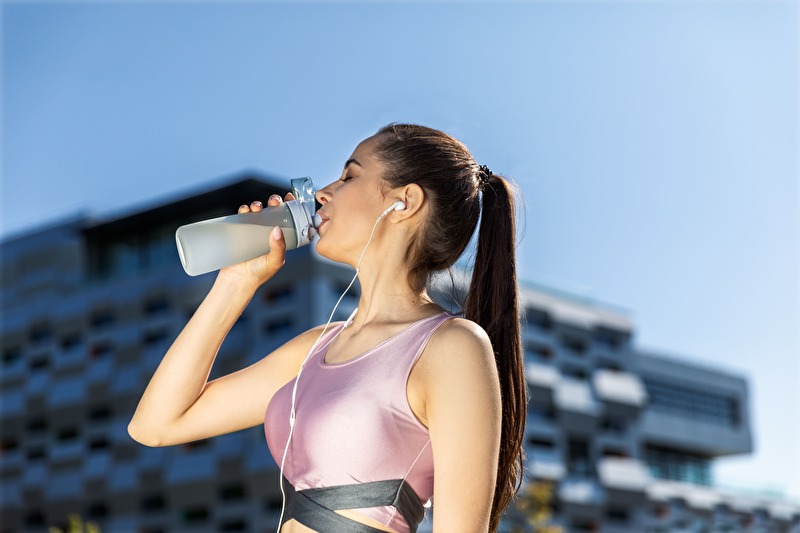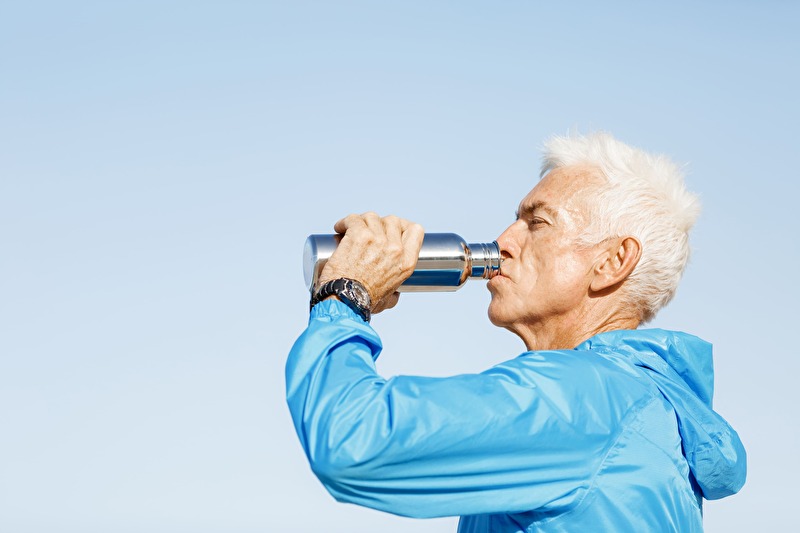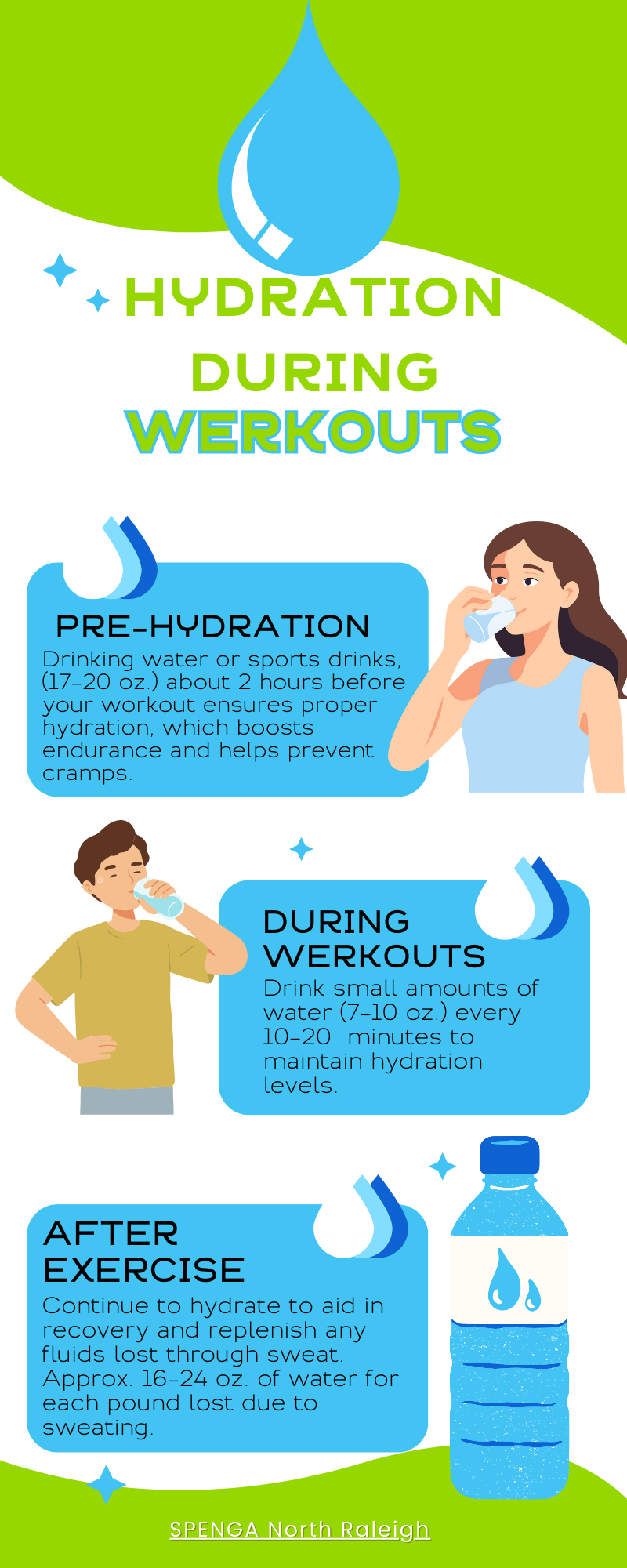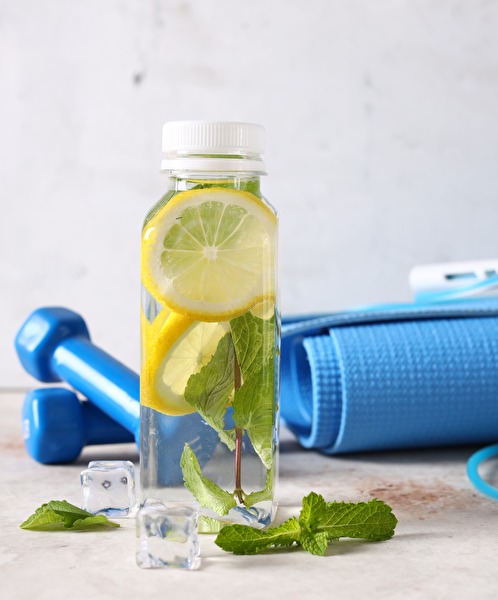
Water. It’s the most vital nutrient your body needs to function, yet it’s often overlooked in daily life. We often hear about the importance of staying hydrated during WERKouts, but hydration goes far beyond that. From energy levels and mental clarity to digestion and muscle recovery, water plays a crucial role in virtually every process within our body. In this article, we’ll explore the science behind hydration, the benefits of staying hydrated for both fitness and overall health, and the best practices to make hydration a natural part of your daily routine.
At SPENGA North Raleigh, we're always looking for ways to help you feel your best. In this article, we'll share some practical tips and challenge you to stay consistent with your water intake. Ready to feel more energized, recover faster, and crush your fitness goals? Let's get started—your body (and your WERKouts) will thank you!
The Science Behind Staying Hydrated: How Water Fuels Your Body
Water isn’t just something we drink; it’s a crucial part of nearly every process in the body. Approximately 60% of the human body is made up of water, and it plays a key role in maintaining energy levels, regulating body temperature, transporting nutrients, and flushing out toxins.
Hydration supports nearly every system in the body, from digestion to circulation and muscle function. Without enough water, the body can't perform at its best—whether that's during a WERKout or simply in daily life.
Water and Energy Levels
One of the most significant roles water plays is in maintaining your energy levels. Dehydration can cause: dry or sticky mouth, headache, muscle cramps, sluggishness, and a decrease in alertness. Even mild dehydration—losing just 1-2% of your body weight in water—can impair your concentration, memory, and overall cognitive function. This means that whether you’re working on a deadline, running errands, or trying to stay engaged in a meeting, dehydration can affect your ability to stay sharp and focused.
Hydration is also critical for keeping your cells functioning properly. Water helps transport nutrients like glucose and oxygen to cells and tissues, which fuel your body’s energy production. When you’re well-hydrated, these nutrients can reach your cells efficiently, giving you the sustained energy you need to power through the day. Without enough water, nutrient transport is compromised, and you may find yourself feeling sluggish or even lightheaded.
Water and Muscle Function
 Source: Freepik
Source: Freepik
When it comes to muscle function, water is absolutely essential. Muscles are about 76% water, and staying hydrated helps maintain optimal muscle performance during physical activity. Water helps in nutrient delivery to muscles and the removal of metabolic waste products, allowing muscles to contract and relax efficiently. Without proper hydration, muscles are more prone to fatigue, cramps, and poor recovery. If you’ve ever experienced a muscle cramp in the middle of a WERKout or a long run, dehydration is likely a contributing factor.
During physical activity, particularly high-intensity exercise, your body loses fluids through sweat, which depletes your water reserves. This can lead to muscle cramps, decreased endurance, and even heat exhaustion if hydration isn’t properly maintained. By ensuring that your muscles are adequately hydrated, you help them perform better, recover faster, and reduce the risk of injury.
Water and Recovery
Post-WERKout recovery is another area where water plays a vital role. After an intense WERKout, your body needs to repair muscle tissue and restore lost fluids. Hydration aids in the transportation of nutrients like protein and carbohydrates to your muscles, which is essential for recovery. It also helps reduce inflammation and soreness by flushing out toxins and reducing the buildup of lactic acid in the muscles.
When you’re properly hydrated, your muscles can recover more efficiently, allowing you to bounce back faster from WERKouts and feel better in the days following intense physical activity.
How Dehydration Impacts Performance and Focus
While hydration is crucial for exercise, it’s just as important in everyday life. Dehydration doesn’t just affect how you feel during your WERKouts—it can have a major impact on your daily functioning and well-being.
Dehydration and Mental Performance
As we discussed earlier, dehydration can impair mental clarity and cognitive function. Even mild dehydration can make it harder to concentrate, cause irritability, and decrease alertness. This is particularly important for those who need to stay sharp for work, school, or personal tasks. In fact, research has shown that dehydration can lead to mood swings, decreased ability to think clearly, and poor decision-making. The brain itself is around 85% water, so when you’re dehydrated, your brain’s performance is directly impacted.
Dehydration and Physical Performance
In addition to cognitive decline, dehydration negatively affects physical performance, whether you’re exercising or just going about your daily routine. Dehydration impairs the body’s ability to regulate temperature, which can lead to overheating, heat exhaustion, or even heat stroke. When you’re dehydrated, your heart has to work harder to pump blood, which raises your heart rate and makes physical exertion more difficult. As a result, activities that would normally feel effortless can become much more challenging.
A dehydrated body has a harder time digesting food and processing nutrients, leading to bloating, constipation, and digestive discomfort. Staying hydrated helps maintain healthy bowel movements and keeps your digestive system running smoothly. It also aids in removing toxins through urine, ensuring your kidneys function properly and helping to prevent kidney stones or urinary tract infections.
How Much Water Should You Be Drinking? Debunking Common Myths
One of the most common misconceptions about hydration is that you need to drink a specific amount of water each day. The “8 cups a day” rule has become widely accepted, but it doesn’t take into account individual needs, activity levels, or environmental factors. The truth is, water needs vary from person to person, and the amount you should drink depends on a number of factors including body size, activity level, and climate.
Daily Water Intake: A Personal Approach
A more personalized approach to hydration is to listen to your body. While 8 cups (64 ounces) of water a day is a good starting point, some people may need more, especially if they’re physically active or live in hot climates. A general guideline to follow is to drink half of your body weight in ounces of water each day. For example, if you weigh 160 pounds, aim for about 80 ounces of water per day. But remember, your body’s hydration needs will increase if you exercise regularly or spend time in hot weather.
Additionally, food contributes to hydration. Many fruits and vegetables are made up of 80-95% water, and consuming these can help you stay hydrated throughout the day. Water-rich foods like watermelon, cucumbers, strawberries, and celery can contribute to your daily hydration needs without you having to drink extra water.
Hydration During WERKouts
When it comes to exercise, it’s important to hydrate before, during, and after your WERKouts.

- Pre-hydration is essential, as it helps prepare your body for the physical stress of exercise. Drinking water or sports drinks, (17-20 oz.) about 2 hours before your WERKout ensures proper hydration, which boosts endurance and helps prevent cramps.
- During WERKouts, especially those that involve high-intensity or prolonged physical activity, you’ll need to replenish lost fluids. Drink small amounts of water every 10-20 (7-10 oz.) minutes to maintain hydration levels.
- After exercise, continue to hydrate to aid in recovery and replenish any fluids lost through sweat. Approximately 16-24 oz. of water for each pound lost due to sweating.
For WERKouts like SPENGA’s combination of Spin, Strength, and Yoga, maintaining proper hydration ensures you can perform at your best in each segment. Dehydration during high-intensity training can cause fatigue and hinder muscle function, making it harder to push through your WERKout. Make hydration a priority before, during, and after your session to maximize performance and recovery.
Electrolytes and Hydration Balance
While water is essential, it’s not the only component of proper hydration. Electrolytes—minerals like sodium, potassium, magnesium, and calcium—help balance the fluids in your body and are crucial during prolonged or intense exercise. These minerals regulate nerve function, muscle contractions, and overall fluid balance.
For longer WERKouts or endurance activities, you may need to replace electrolytes through drinks like coconut water or sports drinks.

Be mindful, though, as some can contain excessive sugars. For quick rehydration, a simple homemade electrolyte drink made with:
- Water: Adjust the amount based on your needs.
- Salt (optional): Use 1/4 to 1/2 teaspoon of salt. Choose sea salt, Himalayan salt, or regular table salt. The salt helps replenish lost sodium.
- Sugar or Sweetener: Use 2-4 tablespoons of your preferred sweetener, like honey, agave nectar, or sugar. This provides carbohydrates for energy.
- Citrus Juice: Add the juice of half a lemon or half an orange. Citrus fruits contain potassium and offer a refreshing taste.
Final Thoughts: Hydration is the Key to Your Well-Being
Hydration isn’t just about chugging water during a WERKout—it’s a key element in supporting every aspect of your life. From mental clarity and energy levels to muscle performance and digestion, proper hydration keeps your body and mind functioning at their best.
To make hydration a habit, start by listening to your body and keeping a water bottle close at hand. Aim for consistent hydration throughout the day, and remember to account for your activity level and environment. Don’t forget that hydration also comes from the foods you eat, so incorporating water-rich fruits and vegetables into your diet can help meet your daily needs. By making hydration a priority, you’ll find that your body performs better, recovers faster, and feels more energized—both inside and outside of the gym.

